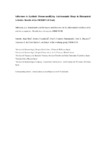Adherence to synthetic disease-modifying antirheumatic drugs in rheumatoid arthritis: results of the OBSERVAR study

Ver/Abrir
Use este enlace para citar
http://hdl.handle.net/2183/30641
Excepto si se señala otra cosa, la licencia del ítem se describe como Creative Commons Attribution-NonCommercial-NoDerivs 4.0 International License (CC-BY-NC-ND 4.0)
Colecciones
- Investigación (FCS) [1293]
Metadatos
Mostrar el registro completo del ítemTítulo
Adherence to synthetic disease-modifying antirheumatic drugs in rheumatoid arthritis: results of the OBSERVAR studyTítulo(s) alternativo(s)
Adherencia al tratamiento con fármacos moduladores de la enfermedad sintéticos en la artritis reumatoide: resultados del estudio OBSERVARAutor(es)
Fecha
2019-01-10Cita bibliográfica
Juan Mas A, Castañeda S, Cantero Santamaría JI, Baquero JL, Del Toro Santos FJ; en representación del grupo de trabajo OBSERVAR. Adherence to synthetic disease-modifying Antirheumatic Drugs in Rheumatoid Arthritis: Results of the OBSERVAR Study. Reumatol Clin (Engl Ed). 2019 Sep-Oct;15(5):264-270. English, Spanish.
Resumen
[Abstract] Background: Treatment compliance with disease-modifying antirheumatic drugs (DMARD) is essential to achieve the therapeutic goals in rheumatoid arthritis (RA). However, despite the need for good compliance, there is evidence that patients with RA frequently fail to use DMARD for the control of RA. Thus, the main objective of the OBSERVAR study is to evaluate the reasons for the lack of therapeutic adherence to synthetic DMARD in these patients.
Patients and methods: A Delphi process involving 18 randomly selected Spanish rheumatologists determined the level of agreement with 66 causes of noncompliance selected from the literature in relation to synthetic DMARD in RA.
Results: The reasons for noncompliance were consistent in 75.7%, although 3 reasons (4.5%) were highly consistent: 1) not knowing what to do in the case of an adverse event with DMARD; 2) not having undergone adherence screening by health personnel for early detection of "noncompliant patients"; and 3) not having undergone interventions or strategies that improve adherence.
Conclusion: In order to improve adherence to RA treatment with synthetic DMARD, the patient should be adequately informed of each new treatment introduced, the patient's compliance profile should be incorporated into the clinical routine and the patient's motivation for therapeutic compliance be reinforced through the methods available to us. [Resumen] Introducción. La cumplimentación del tratamiento modificador de la enfermedad es esencial para alcanzar los objetivos terapéuticos en la artritis reumatoide (AR). Sin embargo, y a pesar de la necesidad de una buena adherencia, existe evidencia de que muchos pacientes con AR no cumplen adecuadamente con la prescripción del tratamiento indicado con fármacos moduladores de la enfermedad de acción lenta (FAME) sintéticos o convencionales. Conscientes de la importancia de este hecho, el estudio sobre observancia terapéutica en AR (estudio OBSERVAR) tiene como objetivo principal valorar los motivos de la falta de adherencia terapéutica a los FAME sintéticos en estos pacientes.
Pacientes y métodos. Mediante un proceso Delphi entre 18 reumatólogos españoles seleccionados aleatoriamente se determinó el grado de acuerdo con 66 causas de incumplimiento seleccionadas de la bibliografía, en relación con los FAME sintéticos en la AR.
Resultados. Los motivos de incumplimiento fueron consistentes en el 75,7%, si bien 3 razones (4,5%) destacaron como muy consistentes: 1) desconocer qué hacer cuando se sufre un acontecimiento adverso con el FAME; 2) no llevar a cabo métodos de cribado de la adherencia por el personal sanitario para detectar a los «pacientes incumplidores» de forma temprana y 3) no aplicar intervenciones o estrategias que mejoren la adherencia terapéutica.
Conclusión. Para mejorar la adherencia al tratamiento de la AR con FAME sintéticos se debe informar al paciente de cada tratamiento nuevo introducido, incorporar el perfil de cumplimiento del paciente en la rutina clínica, y reforzar la motivación del paciente al cumplimiento terapéutico mediante los métodos a nuestro alcance.
Palabras clave
Rheumatoid arthritis
Adherence
Therapeutic compliance
DMARD
Methotrexate
Artritis reumatoide
Adherencia
Cumplimiento terapéutico
Fármacos moduladores de enfermedad
Metotrexato
Adherence
Therapeutic compliance
DMARD
Methotrexate
Artritis reumatoide
Adherencia
Cumplimiento terapéutico
Fármacos moduladores de enfermedad
Metotrexato
Versión del editor
Derechos
Creative Commons Attribution-NonCommercial-NoDerivs 4.0 International License (CC-BY-NC-ND 4.0)
ISSN
2173-5743






